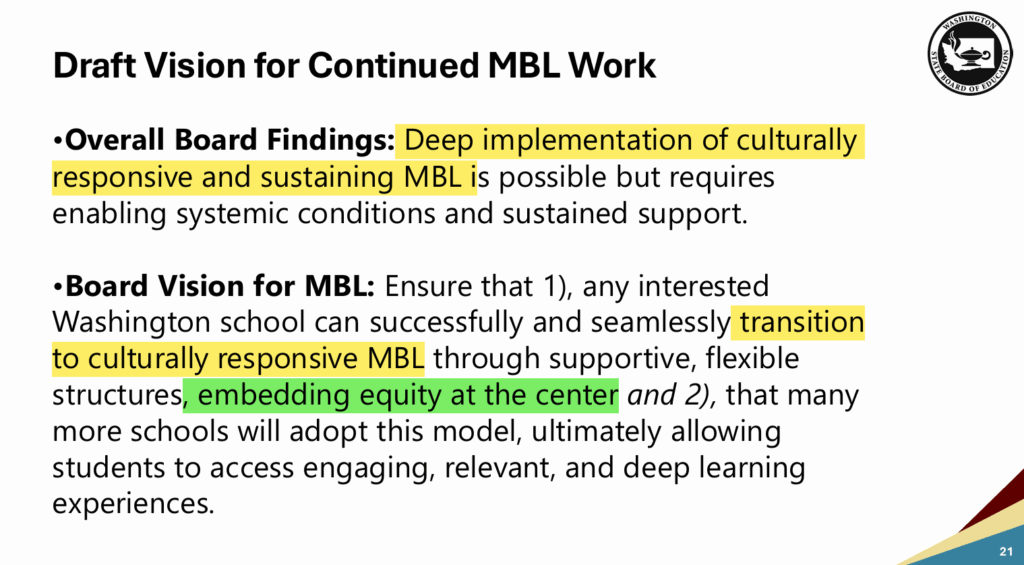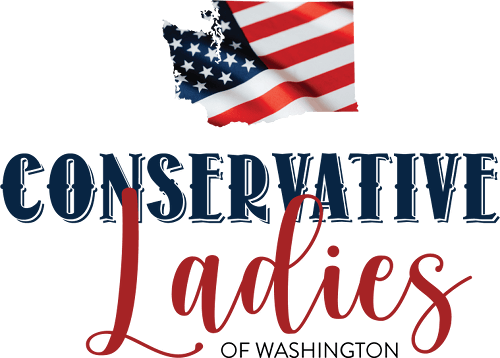Washington’s education system is undergoing a quiet but sweeping transformation. At the center of this shift is a framework called Mastery-Based Learning (MBL), a model championed by the Washington State Board of Education (SBE) and embedded in a multi-year initiative known as the Mastery-Based Learning Collaborative (MBLC). While the language may sound student-centered and innovative, the reality is far more ideological. MBL is being used to embed equity mandates, culturally responsive teaching, and emotional engagement into every layer of instruction, often at the expense of academic rigor and parental involvement.
The MBLC was launched in 2021 as a demonstration project to pilot culturally responsive MBL across Washington. Since then, it has evolved into a statewide transformation strategy, backed by millions in legislative funding and guided by a network of nonprofits, consultants, and state agencies. The goal, according to the SBE’s October 2025 report, is not uniform academic success, but rather to explore what “quality culturally responsive MBL” looks like and how to scale it.
What Is Mastery-Based Learning?
MBL, as defined by the SBE and codified in RCW 28A.255.010, includes seven core elements. These range from flexible pacing and student-led learning to performance-based assessments and differentiated support. But the most concerning element is the explicit requirement that equity be embedded in the “culture, structure, and pedagogy” of every school.
In practice, this means students are evaluated not just on knowledge, but on emotional traits like “belonging,” “joy,” and “agency.” Teachers are trained to embed culturally responsive practices into every lesson. And grading is increasingly based on subjective competencies—including “dispositions”—rather than objective mastery of academic subjects.
MBL’s 7 Core Elements of Competency:
- Student Empowerment: Students make daily decisions about how they learn and demonstrate knowledge.
- Assessment as Empowerment: Testing becomes a “positive experience” focused on feelings and feedback.
- Differentiated Support: Instruction is tailored to individual needs—but without clear academic benchmarks.
- Progress by Mastery, Not Seat Time: Students move forward when they “master” content, even if mastery is loosely defined.
- Flexible Pathways: Learning is personalized, paced, and often detached from traditional subjects.
- Equity Embedded in Culture and Pedagogy: DEI principles are woven into every layer of instruction.
- Transparent, Transferable Competencies: Learning expectations include “dispositions”—a term often used to justify identity-based grading.
How Did We Get Here?
Since 2019, the legislature has passed a series of bills to fund and expand MBL:
- E2SHB 1599 created the original MBL Work Group
- SSB 5249 authorized the “Profile of a Graduate” and aligned graduation requirements
- ESSB 5092 allocated $5 million to launch demonstration sites
- ESSB 5187 added a second cohort and expanded funding with federal ESSER dollars
- SB 5189 redefined MBL as Competency-Based Education and embedded equity into law
Despite budget constraints, the state continues to invest in this model, because it’s not about improving test scores, it’s about transforming the values that underlie education.

What’s Happening in Schools?
Participating schools receive individualized coaching, professional development, and grant funding to implement MBL. Funds are used to hire in-house coaches, purchase culturally responsive materials, and train staff in equity-based grading. Students are encouraged to lead projects, articulate personal goals, and engage in flexible learning pathways.
The SBE’s report claims this has led to higher engagement, stronger teacher-student relationships, and a greater sense of cultural representation. But these are subjective metrics. There’s no mention of improved literacy, math proficiency, or science comprehension. Instead, success is defined by emotional resonance and ideological alignment.
Testing Without Mastery: How MBL Redefines Assessment
One of the most concerning shifts under Washington’s Mastery-Based Learning (MBL) framework is the redefinition of student assessment. Traditional testing, based on objective measures of academic achievement, is being replaced by performance-based assessments, formative feedback loops, and competency evaluations that prioritize emotional traits and cultural alignment over subject mastery.
According to the State Board of Education’s 2025 findings, MBL schools are moving away from standardized tests and toward assessments that are “positive and empowering learning experiences.” In practice, this means students are often evaluated on their ability to articulate personal goals, demonstrate “agency,” and participate in culturally responsive projects. The emphasis is on how students feel about learning, not whether they’ve mastered the material.
This shift is framed as equity-driven. Teachers are encouraged to use data to “address inequities,” and grading is increasingly based on competencies that include dispositions, a term that can encompass attitudes, behaviors, and identity markers. While this may sound inclusive, it opens the door to subjective grading and ideological bias, where academic rigor takes a back seat to emotional engagement and cultural representation.
Many classrooms now feature flexible pacing, differentiated supports, and student-led projects. While these strategies can be valuable when paired with strong academic standards, under MBL they often replace those standards entirely. Students may progress based on “evidence of mastery,” but mastery itself is loosely defined and varies from school to school. There is no consistent benchmark for reading proficiency, math fluency, or scientific literacy.
When testing becomes a tool for affirming feelings rather than measuring knowledge, students lose the opportunity to build foundational skills that prepare them for college, careers, and civic life. Parents are left in the dark, unable to track their child’s academic progress in any meaningful way. And taxpayers are funding a system that prioritizes ideology over outcomes.

Why Parents Should Be Concerned
This model sidelines families in favor of state agencies and nonprofit consultants. The same organizations that design the program, like FullScale Learning (formerly Aurora Institute) and Great Schools Partnership, are also tasked with evaluating its success. There is no independent oversight, no academic accountability, and no meaningful role for parents in shaping what their children learn.
Grading is no longer objective. Competencies now include emotional traits and identity markers. Equity is not just a guiding principle, it’s a requirement. Teachers are expected to embed cultural responsiveness into every lesson, and transcripts will soon reflect these ideological shifts.
Where We Go From Here
Mastery-Based Learning is not a passing trend; it’s a deeply embedded framework that has been in development for years. Since 2019, Washington’s legislature has steadily advanced this model through bipartisan support. Democrats and Republicans alike have voted for bills that fund, expand, and codify MBL, often with little public debate and virtually no opposition.
This reality demands a dual response. On one hand, we must continue to advocate for reform within our public schools, calling out ideological overreach, demanding transparency, and pushing for a return to academic excellence. But on the other hand, we must also face the urgency of the moment. If your child is in a school that prioritizes feelings over fundamentals, equity over evidence, and cultural sustainability over core subjects, it may be time to consider other educational options.
Parents cannot afford to wait for repeal or reversal. We must act now to ensure our children receive the rigorous, knowledge-based education they need to thrive in college, careers, and civic life. Whether that means exploring alternative schooling, supplementing at home, or joining advocacy efforts to restore academic standards, the time for passive concern is over.
Washington’s education system has been reengineered. Let’s make sure our children aren’t left behind.
Support Our Mission
Conservative Ladies of Washington is a 501(c)(4) citizen-run political watchdog organization committed to exposing harmful education policies and defending parental rights. Your donation helps us mobilize families, produce investigative content, and fight for academic excellence in our schools.



